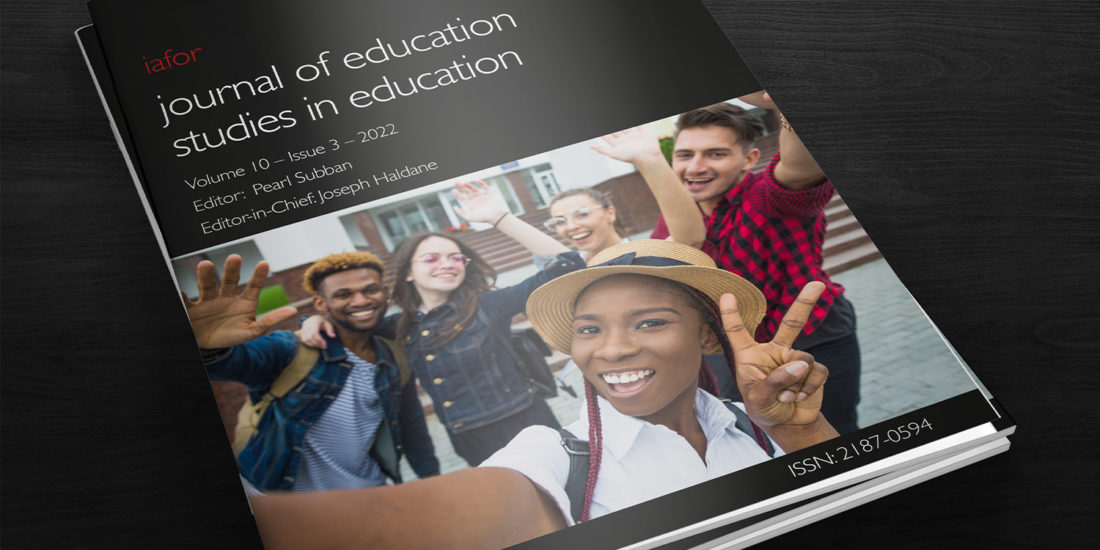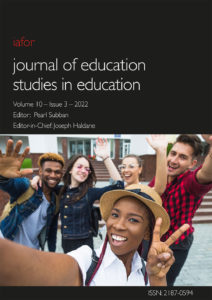Welcome to the Studies in Education Issue
IAFOR Journal of Education: Volume 10 – Issue 3 – Studies in Education
Editor: Pearl Subban, Monash University, Australia
Editor-in-Chief: Joseph Haldane
Published: December 4, 2022
ISSN: 2187-0594
https://doi.org/10.22492/ije.10.3
Greetings readers!
So much of our world has changed. Human interaction has been profoundly impacted by the global pandemic, and political shifts across the globe have altered the way we think and operate. These global movements and shifting thinking have resulted in a progressive awareness of how socially equitable and socially just frameworks should influence all human behaviours. It is heartening to note that Indigenous and traditional knowledge are being valued and embedded into educational contexts, driving change to alter the paths of the younger generations to a healthier future. Despite significant strides however, much remains to be done. As educators, we understand that our work is ongoing, consistent and continuous. Learning is not a destination, it is a voyage, often into unknown spaces, and therefore requiring courage and wisdom. Accommodating all students, celebrating diversity and valuing individual skill is now fundamental to our work. Against this backdrop, we seek daily to identify strategies that are responsive, respectful and sensitive to student needs.
This issue draws together six key articles, located in environments across the world, and touching on a range of central concerns, as we emerge from the era of the pandemic. Recent research in education has focused on the virtual classroom, examining the most effective means of catering to student needs in the online classrooms. Additionally, the ubiquitous nature of social media platforms compels educators to rethink its position in classrooms, and to explore ways in which these forums can be used in the learning and teaching process. Dialogue and discourse in classrooms remain a central feature of learning environments, and an investigation of how these forms of communication can be fostered and encouraged is essential. Apart from these technological innovations, the need to advance education in rural and regional contexts is being viewed as a priority, with both technology and in-situ experiences being amalgamated to provide equitably for students. The isolating experiences of the pandemic triggered the need for greater collaboration among students, drawing them together to not just imbibe knowledge more socially, but to become aware of the range of social dynamics that now inhabit our world.
To help you get oriented, here is a brief summary of each article in the issue.
Article 1
Teacher Futures: Global Reaction to Teacher Shortages in Rural Locations
Teacher shortages across the world are now endemic and will impact on educational provision for all young people. In the first manuscript, the authors draw on a comparative study among three nations, examining hiring practices to strengthen the work force, and the incentivisation of staff especially with regard to teaching in rural contexts. Evidently, greater dialogue and support is required to draw educators into these vulnerable contexts.
https://doi.org/10.22492/ije.10.3.01
Article 2
The Effects of Online Collaborative Learning (OCL) on Student Achievement and Engagement
With much of the world transitioning to online learning, our second featured piece reflects on how online collaborative learning impacts on student achievement and engagement. Located in the Philippines, this quantitative study drew on pre-test and post-test scores to consider student cooperation, interest and participation in the online classroom. Results revealed that intentional strategies improved the overall student experience in this context.
https://doi.org/10.22492/ije.10.3.02
Article 3
Educational e-Portfolio Overview: Aspiring for the Future by Building on the Past
Remaining within the arena of virtual learning, a joint collaboration spanning Hong Kong and Spain, reflected on the innovative use of e-portfolios in contemporary learning contexts. The use of a review of several articles yielded positive results, however more longitudinal research would be appropriate to more accurately gauge the effective use of the e-portfolio.
https://doi.org/10.22492/ije.10.3.03
Article 4
“What Motivates Me?”: A Qualitative Perspective on Student Collaboration in Small Groups
The fourth submission curated for this issue, also hones in on student experiences, exploring social interdependence and its impact on academic outcomes in learning contexts. As a qualitative exploration located in Malaysia, and utilising interviews, this study yielded the view that motivation during collaboration was influenced by mutual interests, accountability and the group size.
https://doi.org/10.22492/ije.10.3.04
Article 5
An Exploratory Investigation into Classroom Discourse in a Bruneian University
Following this, a Bruneian study examined discourse in the classroom, assessing the nature and quality of dialogue with a view to strengthening engagement, prompting prepared thinking around questioning techniques, and facilitating critical thinking in classrooms.
https://doi.org/10.22492/ije.10.3.05
Article 6
WhatsApp Remote Reading Recovery: Using Mobile Technology to Promote Literacy during COVID-19
The final submission considered how social media platforms could be effectively utilised to promote learning. Contextualised in Panama, the study utilised a 12-week intervention to contemplate the feasibility of utilising social media platforms in educational contexts. Evidently, the use of more accessible mediums of communication in the modern age, could also facilitate effective communication and collaboration in classrooms.
https://doi.org/10.22492/ije.10.3.06
The classroom of the future certainly appears different. Multiple dynamics now interplay to alter the perceptions and provision of education. Both educators and learners are poised for a varied experience from that offered a mere decade ago. This compilation of articles illustrates this diversity in thinking as we forge ahead into the post pandemic era.
Pearl Subban, PhD, Editor
IAFOR Journal of Education: Studies in Education


